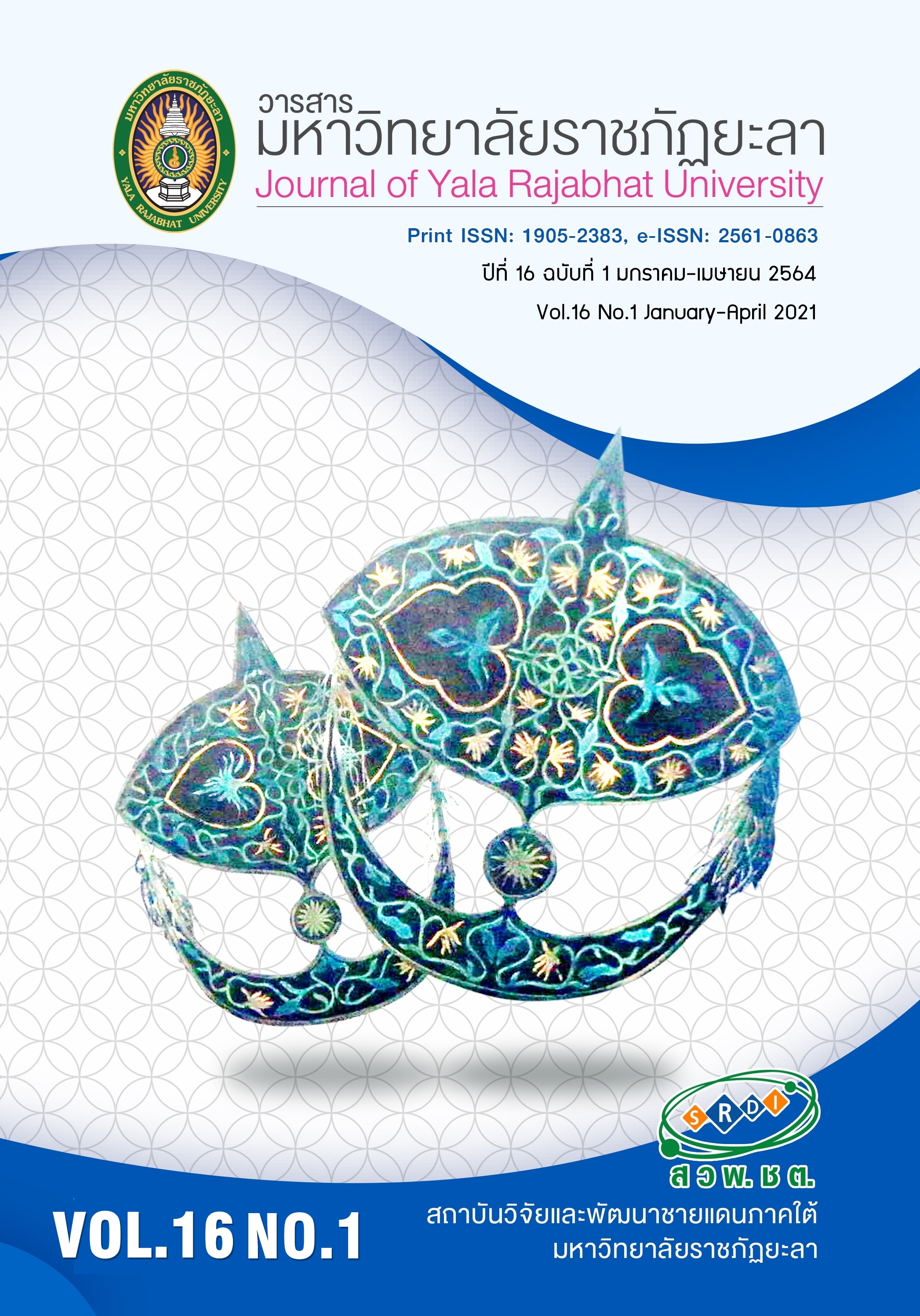การจัดการเรียนรู้วิชาแคลคูลัสของนักศึกษาชั้นปีที่ 1 มหาวิทยาลัยราชภัฎยะลา ด้วยรูปแบบการเรียนรู้แบบย้อนกลับร่วมกับการเรียนแบบร่วมมือเทคนิค STAD
Main Article Content
บทคัดย่อ
วิชาแคลคูลัสถือเป็นหนึ่งในรายวิชาคณิตศาสตร์ที่มีความยาก ทำผู้เรียนมีความเข้าใจในเนื้อหาแคลคูลัสไม่ลึกซึ้ง และมีทักษะกระบวนการทางคณิตศาสตร์ไม่ดีพอ ส่งผลให้การเรียนวิชาแคลคูลัสของนักศึกษาชั้นปีที่ 1 มหาวิทยาลัยราชภัฎยะลาเกิดปัญหา และทำให้การเรียนในรายวิชาอื่น ๆ ที่จำเป็นต้องใช้วิชาแคลคูลัสเป็นพื้นฐานมีผลกระทบตามไปด้วย ดังนั้นเพื่อแก้ปัญหาที่เกิดขึ้นจึงได้นำรูปแบบการเรียนรู้แบบย้อนกลับร่วมกับการเรียนแบบร่วมมือเทคนิค STAD มาใช้ในการจัดการเรียนรู้วิชาแคลคูลัสของนักศึกษาชั้นปีที่ 1 มหาวิทยาลัยราชภัฎยะลา โดยมีวัตถุประสงค์เพื่อศึกษาผลสัมฤทธิ์ทางการเรียน ความคงทนในการเรียนรู้และแรงจูงใจใฝ่สัมฤทธิ์ที่มีต่อวิชาแคลคูลัสของนักศึกษา ศึกษาจากคะแนนผลสัมฤทธิ์ทางการเรียนและการวัดจากการตอบแบบสอบถามในเรื่องของแรงจูงใจใฝ่สัมฤทธิ์จากกลุ่มตัวอย่างจำนวน 40 คน ด้วยสถิติการหาค่าร้อยละ ค่าเฉลี่ย ค่าเบี่ยงเบนมาตรฐาน และการทดสอบที (t-test) ผลปรากฏว่า นักศึกษาชั้นปีที่ 1 มีผลสัมฤทธิ์ทางการเรียนหลังเรียนสูงกว่าก่อนเรียนอย่างมีนัยสำคัญทางสถิติที่ระดับ 0.05 ความคงทนในการเรียนหลังจากเว้นระยะไป 2 สัปดาห์ ไม่แตกต่างกัน และแรงจูงใจใฝ่สัมฤทธิ์ของนักศึกษาชั้นปีที่ 1 อยู่ในระดับมาก ผลการวิจัยอธิบายได้ว่าการนำวิธีการสอนการเรียนรู้แบบย้อนกลับและการเรียนแบบร่วมมือเทคนิค STAD มาปรับใช้ร่วมกันในรายวิชาแคลคูลัสส่งผลให้คะแนนของรายวิชานี้เพิ่มขึ้นมากกว่าการสอนด้วยวิธีการสอนด้วยการบรรยายเพียงอย่างเดียว นอกจากนี้การนำกระบวนการกลุ่มมาประยุกต์ใช้ยังเป็นการให้นักศึกษาได้มีส่วนร่วมในการเรียนรู้ ร่วมกันแลกเปลี่ยนความรู้ ส่งผลให้จดจำเนื้อหาสาระการเรียนรู้ได้มากขึ้น
Article Details
บทความ ข้อมูล เนื้อหา รูปภาพ ฯลฯ ที่ได้รับการเผยแพร่ในวารสารมหาวิทยาลัยราชภัฏยะลานี้ ถือเป็นลิขสิทธิ์ของวารสารมหาวิทยาลัยราชภัฏยะลา หากบุคคลหรือหน่วยงานใดต้องการนำทั้งหมดหรือส่วนหนึ่งส่วนใดไปเผยแพร่ต่อหรือกระทำการใดๆ จะต้องได้รับอนุญาตเป็นลายลักษณ์อักษรจากวารสารมหาวิทยาลัยราชภัฏยะลาก่อนเท่านั้น
เอกสารอ้างอิง
Abdul, R., Ansari, A. & Rusli, R. (2016). The influence of cooperative learning models on learning outcomes based on students’ learning styles. World Transactions on Engineering and Technology Education, 14(3), 425 – 430.
Adam, J. A. (1969). Human memory. New York: McGraw – Hill.
Ferrini, J. & Lauten, D. (1994). Learning about calculus learning. The Mathematics Teacher, 87(2), 115 – 120.
Inpoolwong. N. (2016). Learning achievement of mathematics, attitude toward mathematics and group working behaviors of Prathomsuksa VI students through cooperative learning STAD technique. Thesis Master of Education. Graduate School, Burapha University. (in Thai)
Kingmala, P. & Boonsuk, N. (2017). The development of basic mathematics lesson in calculus 1 course for undergraduate students. Veridian E-Journal,Silpakorn University, 10(2), 597–607. (in Thai)
Korlertvolapong, P., Sriprasertsuk, A., Traiphong, P. & Leelakitpaisarn, Y. (2019). A study of achievement motivation of students in Faculty of Humanities and Social Sciences,Suan Dusit Rajabhat University. Romphruek Journal, 34(3), 35–54. (in Thai)
Kongme, K. (2018). The results of cooperative learning management using STAD technique on multiplication and polynomial division of Mathayomsuksa 1 students at Yothinburana School. Thesis Master of Education. Graduate School, Ramkhamhaeng University. (in Thai)
Laeheem, K. (2011). Students' bullying behavior: Book review. Kasetsart Journal: Social Sciences, 32(1), 158-166. (in Thai)
Lumbensa, P. & Churngchow, C. (2010). Factors influencing learning achievement motivation of Mathayomsuksa three student in islamic private schools in Changwat Pattani. Thesis Master of Education. Graduate School, Prince of Songkla University. (in Thai)
Ministry of Education. (2017). Foundation course, basic education 2008. Bangkok: The Agricultural Cooperative Federation of Thailand. (in Thai)
Moolkum, S. (2017). 19 learning management methods: to develop knowledge and skills. Bangkok: Pappim. (in Thai)
Srisa – Ard, B. (2017). Preliminary research (10th Ed). Bangkok: Suviriyasarn. (in Thai)
Srisongkram, W., Rattanasanya, S., Potpattapol, R. & Tepprasit, P. (2007). General psychology. Bangkok: Tripple Education. (in Thai)
Sukamolson, S. (2010). The size of the results: Practical significance in research. Pasaa Paritat Journal, 25, 30-32. (in Thai)
Teppabut, K. (2019). Backward design instruction combined with questioning technique in mathematic for analysis thinking development of Mathayomsuksa 1 students. Rajabhat Rambhai Barni Research Journal, 13(1), 141 - 148. (in Thai)
Tran, V.D. (2014). The Effects of Cooperative Learning on the Academic Achievement and Knowledge Retention. International Journal of Higher Education, 3(2), 131 – 140.
Wongyai, W. (2011). Curriculum innovation and citizen learning. Bangkok: R and print. (in Thai)
Yala Rajabhat University. (2018). Report academic results of the first year students, faculty of science technology and agriculture, Yala Rajabhat University. Yala: Yala Rajabhat University. (in Thai)


